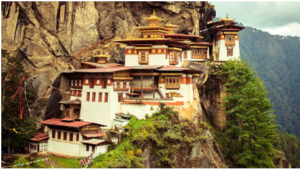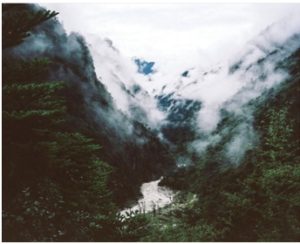
Bhutan, often perceived as James Hilton’s real-life Shangri-La, is no ordinary place. Comfortably tucked between two of the world’s most populous countries, this landlocked, mountain-clad kingdom is home to a rich and thriving culture that believes in carefully embracing global developments. Regarded by many as the world’s happiest country, it is indisputably one of the greenest. At a time when the rest of the world is struggling to inch ahead both politically and environmentally, this peppy pocket of about 790,000 people has emerged as a dark knight on the International stage to become the world’s only Carbon Negative nation.
What that means is that the country’s carbon emissions are not only offset but are now in the negative. According to reports, Bhutan generates about 2.2 million tonnes of CO2, but its forests sequester more than three times the amount. Besides a thick cover of forests, some of nature’s other gifts to Bhutan include its fast-flowing rivers, the use of which to generate electricity helps offset about 6 million tonnes of CO2. By 2020, Bhutan will be generating enough electricity to offset 17 million tonnes of CO2 annually.

The Bhutanese government’s vision is to improve the happiness and the well-being of its people economically, environmentally, and socio-culturally and their contribution to this noble pursuit cannot be understated. The Prime Minister of Bhutan, Tshering Togbay reiterated his government’s commitment in his recent TED Talk stating, “Our enlightened monarchs have worked tirelessly to develop our country, balancing economic growth carefully with social development, environmental sustainability and cultural preservation.” He also emphasized the prioritization of happiness before economic growth as the key driver of their nation’s progress. Taking a more holistic view of development, this tiny kingdom uses a socioeconomic index called the Gross National Happiness Index instead of the standard Gross Domestic Product used elsewhere.
Bhutan’s constitution demands that a minimum of 60% of the country’s total land area remain under forest cover. Currently, 72% of its landmass is under forest cover, with most of it being protected as natural reserves and sanctuaries, all being connected by a network of biological corridors to facilitate free animal movement. Further, the communities living in those parks are given resources to maintain them. This helps in preventing poaching, mining and deforestation in those parks. The government is also striving to empower citizens by allowing free schooling, healthcare, and electricity. The idea is that if the citizens are provided free electricity, they would not switch to burning firewood. Investment in sustainable transport, subsidization of electric vehicles, transition to a paperless government and the flagging off of national programs such as ‘Clean Bhutan’ and ‘Green Bhutan’ further strengthen their resolve.
What sets the tiny Buddhist kingdom apart though is its people’s reverence for trees and their readiness in putting the needs of its fragile ecosystem ahead of theirs. It has won world records for planting the most trees per hour. Despite all of their combined efforts, Bhutan is bearing the brunt of something that none of its citizens is even remotely responsible for. Climate change is disrupting its ecosystem. Fast melting glaciers, flash floods and irregular monsoons are destroying the ecosystem and causing a water scarcity during dry seasons. The Bhutanese are nonetheless resilient, doubling down on their efforts to fight this problem. It is now high time that the rest of us pick up the pace. Unfortunately, what should be a norm in today’s standards is still an oddity.
Picture credits National Geographic and Lonely Planet


One Response
Great article. I am experiencing many oof these issues ass well..